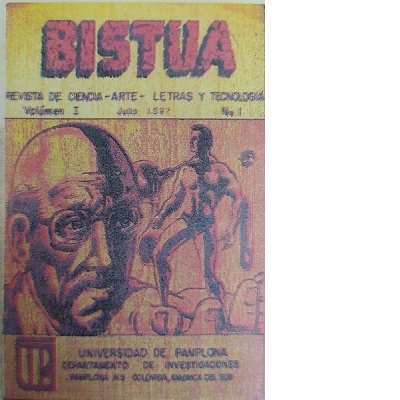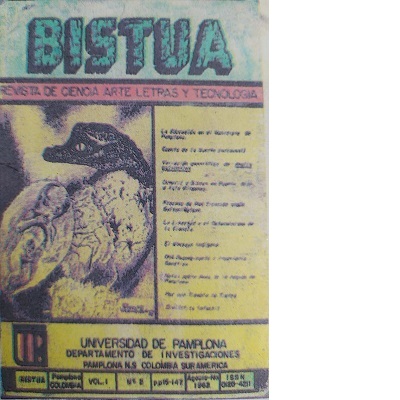About the Journal
 |
BISTUA, Volume 1, No.1 and 2 (1982) |
 |
In January 2004, Volume 2, No.1 was published, and since then, BISTUA has been the journal of the Faculty of Basic Sciences of the University of Pamplona-Colombia, with a semi-annual frequency. Its mission is the dissemination of original research results that contribute to expanding knowledge in natural and exact sciences.
Focus and Scope
BISTUA, the journal of the Faculty of Basic Sciences of the University of Pamplona, has the mission of disseminating original research that expands knowledge in natural and exact sciences. With a semi-annual frequency and a multidisciplinary approach, the journal publishes high-rigor scientific articles in areas such as Biology, Microbiology, Physics, Geology, Chemistry, Mathematics, and Applied Basic Sciences. BISTUA aims to be a reference for academics, researchers, and professionals, promoting open access to knowledge and fostering scientific exchange both nationally and internationally. Through its peer-review process, it ensures the quality and relevance of the published work, strengthening the advancement of science in its fields of interest.
Publication Areas
The journal covers a wide range of disciplines within natural and exact sciences, focusing on Biology, Microbiology, Physics, Geology, Chemistry, Mathematics, and Applied Basic Sciences. The journal is dedicated to publishing research that promotes the advancement of knowledge in these fundamental areas, ranging from theoretical studies to practical applications that impact various scientific sectors.
Publication Frequency
Publication frequency: Semi-annual.
Vol. 1 No. 1 from January to June.
Vol. 1 No. 2 from July to December.
Open Access Policy
 |
This journal provides immediate open access to its content under the principle of supporting and sharing knowledge, therefore there are NO submission or processing charges. The BISTUA journal is a scientific open-access publication, distributed under the terms of the Creative Commons Attribution-NonCommercial-NoDerivatives 4.0 International license (CC BY-NC-ND 4.0 DEED). This license allows users to copy and redistribute the material in any format or medium, as long as proper credit is given to the author and source. The material may not be used for commercial purposes, nor modified or used to create derivative works. |
Submission and Publication Fees. Free of Charge
BISTUA is an Open Access publication that does not charge any fees for the arbitration and publication process, which includes review, layout, printing, and distribution (APCs). As an open-access journal, there is also no fee for consulting and downloading the journal.
Anti-Plagiarism Policy
Through the use of Turnitin software, licensed by the University of Pamplona, the journal conducts plagiarism and self-plagiarism analysis to ensure the originality of the manuscripts received. The journal editor registers the author's document in this online software.
Digital Preservation Policy and Use of Uniform Identifier
BISTUA ensures the digital preservation of its content through the effective use of Open Journal Systems (OJS). All articles published in the journal are equipped with a Digital Object Identifier (DOI), a persistent identifier managed by Crossref, which guarantees long-term accessibility and traceability of publications.
Additionally, the journal is part of the PKP Preservation Network (PKP PN), where its contents are securely stored in the LOCKSS system, developed by Stanford University Library. This digital preservation infrastructure ensures a permanent and reliable archive for the journal, protecting access to information from potential digital losses or deterioration.
BISTUA currently operates on the Open Journal Systems 3.3.0.11 platform and is indexed in several national and international repositories, including Latindex, DIALNET, BIBLAT, REDALYC, among others. It has also been evaluated and classified in category C of the Publindex Colombia index, a status it continues to hold. All published articles use DOIs as uniform resource identifiers, which are managed and registered within the OJS system.
Interoperability Protocol
The journal not only implements advanced interoperability protocols, such as OAI-PMH (Open Archive Initiative-Protocol for Metadata Harvesting), but also ensures that its content is easily accessible and reusable by a wide range of distribution systems, including digital repositories, harvesters, and academic search engines. Thanks to integration with systems like LOCKSS and CLOCKSS, the journal guarantees long-term preservation and continuous access to its published issues, providing greater security to readers and institutions interested in the permanence of information. Furthermore, the journal offers detailed, high-quality metadata, facilitating indexing and visibility on global platforms, contributing to knowledge exchange and the expansion of its academic impact.
Ownership and Management
The University of Pamplona is the publishing entity that, through budget allocations for periodicals, sponsors the journal under the responsibility of the Vice Presidency for Research. The journal is published by the University of Pamplona in Colombia, with its main headquarters located in Pamplona, Km 1 Via Bucaramanga University City Pamplona - Norte de Santander - Colombia. For more information, you can contact via phone: 6075685303, Postal Code: 543057, or visit the website: www.unipamplona.edu.co.





